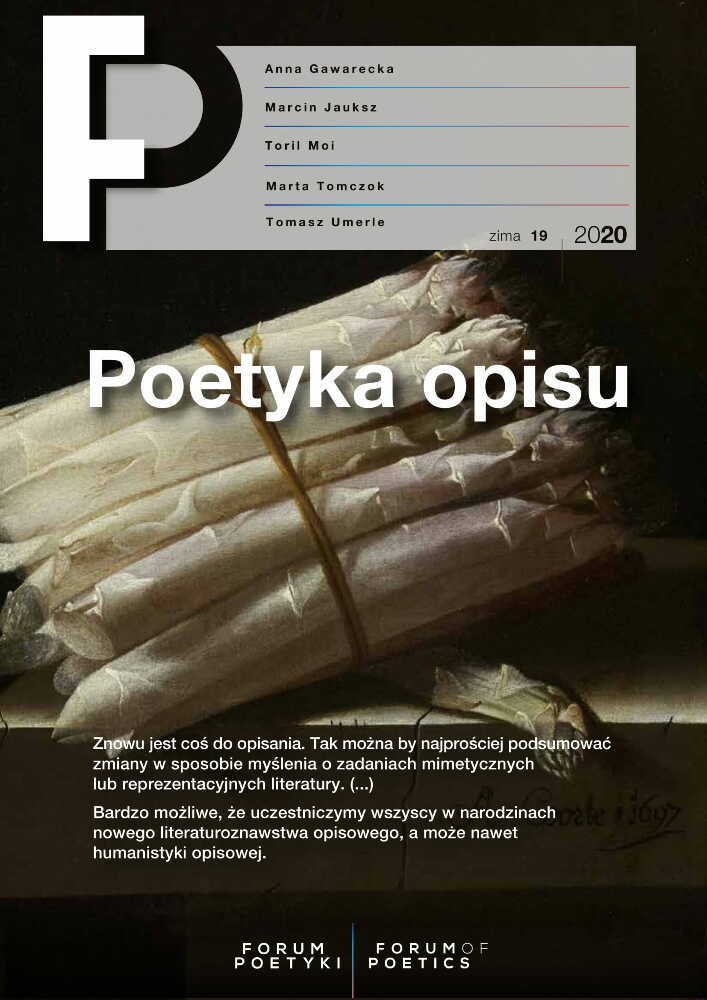Abstract
The paper identifies the category of “documents of a literary system” as a basis for empirical literary studies research. It presents literature and documentation studies, bibliographical and information-scientific aspects of identifying, processing and using documents in this discipline. Based on the available literature, basic types of such objects and their functions within a literary system are indicated. The paper indicates that the dispersion of descriptive procedures of such objects plays a key role for the success of empirical research in literature studies, and it proposes treating this problem as a challenge in adapting the research infrastructures to the empirical needs of literature analyses
References
Andersen, Jack. “The Collection and Organization of Written Knowledge”. In Handbook of Research on Writing: History, Society, School, Individual, Text, 177– 190. London; New York: Erlbaum, 2008.
Balicki, Bogdan. “Empiryczna Nauka o Literaturze - kierunek w badaniach literackich i szkoła naukowa”. Teksty Drugie: teoria literatury, krytyka, interpretacja 124, No 2 (2010): 30–50.
Bode, Katherine. A World of Fiction: Digital Collections and the Future of Literary History. Michigan: University of Michigan Press, 2018. https://search.ebscohost.com/login.aspx?direct=true&scope=site&db=nlebk&db=nlabk&AN=1843205.
Bode, Katherine, and Robert Dixon. “Resourceful Reading: A New Empiricism in the Digital Age?” W Resourceful Reading: The New Empiricism, EResearch and Australian Literary Culture, 1–27. Sydney: Sydney University Press, 2009.
Broeder, Daan, Thorsten Trippel, Emiliano Degl’Innocenti, Roberta Giacomi, Maurizio Sanesi, Mari Kleemola, Katja Moilanen, and others. “SSHOC D3.1 Report on SSHOC (Meta)Data Interoperability Problems (Version v1.0)”, 2019. https://doi.org/10.5281/zenodo.3569868.
Buckland, Michael K. “What is a “Document”?” Journal of the American Society for Information Science 48, No 9 (1997): 804–9. https://doi.org/10.1002/(sici)1097-4571(199709).
Chung, Eun Kyung, ShawneMiksa, and Samantha K. Hastings. “A Framework of Automatic Subject Term Assignment for Text Categorization: An Indexing Conception-Based Approach”. Journal of the American Society for Information Science and Technology 61, No 4 (2010): 688–99.
Darnton, Robert. “«What is the history of books?…=» revisited”. Modern Intellectual History 4, No 3 (2007): 495–508.
Darnton, Robert.. “What Is the History of Books?” Daedalus 111, No 3 (1982): 65–83.
Even-Zohar, Itamar. “The «Literary System»”. Poetics Today 11, No 1 (1990): 27–44. https://doi.org/10.2307/1772667.
Harris, Neil. “Analytical bibliography. An alternative prospectus”. Date of access: 21.02.2020. http://ihl.enssib.fr/analyticalbibliography-an-alternative-prospectus.
Harrower, Natalie, Maciej Maryl, Timea Biro, Beat Immenhauser. “Sustainable and FAIR Data Sharing in the Humanities: Recommendations of the ALLEA Working Group E-Humanities - Digital Repository of Ireland”. Date of access: 21.02.2020. https://repository.dri.ie/catalog/tq582c863.impresso. “Https://Impresso-Project.Ch/”. Date of access: 21.02.2020. https://impresso-project.ch/.
Kasprzik, Anna. “Putting Research-based Machine Learning Solutions for Subject Indexing into Practice”. In Proceedings of the Conference on Digital Curation Technologies (Qurator 2020), http://nbn-resolving.de/urn:nbn:de:0074-2535-7.
Lund, Niels Windfeld. “Document Theory”. Annual Review of Information Science and Technology 43, No 1 (2009): 1–55. https://doi.org/10.1002/aris.2009.1440430116.
McKenzie, Donald Francis. Bibliography and the Sociology of Texts. London: British Library,1986. http://site.ebrary.com/id/10015014.
Ranganathan, S. R. Documentation and Its Facets, Being a Symposium of Seventy Papers by Thirty-Two Authors. Bombay: Asia Publishing House, 1963.
Rubin, Joan Shelley. “What Is the History of the History of Books?” The Journal of American History.90, No 2 (2003): 555–75. https://doi.org/10.2307/3659444.
Schmidt, Siegfried J. “Dlaczego empiryczne badania literackie? Dlaczego nie?” Translated by Agata Zawiszewska. Pamiętnik Literacki (Lwów ; 1902). 99, No 2 (2008): 107–19.
Schmidt, Siegfried J. “Empirical Studies in Literature and the Media Today”. Poetics 18, No 2 (1989): 1–6.
“Strategy Report on Research Infrastructures: Roadmap 2018”, 2018. http://roadmap2018.esfri.eu/.
Strojek, Agnieszka. “Znaczenie terminu szara literatura”. Zagadnienia Informacji Naukowej., No 1 (2000): 64–76.
Tötösy de Zepetnek, Steven, and Irene Sywenky, eds. The Systemic and Empirical Approach to Literature and Culture as Theory and Application. Edmonton; Siegen: Research Institute for Comparative Literature and Cross-Cultural Studies, University of Alberta ; Institute for Empirical Literature and Media Research, Siegen University, 1997.
Windfeld Lund, Niels. “Document, text and medium: concepts, theories and disciplines”. Journal of Documentation 66, No 5 (2010): 734–49. https://doi.org/10.1108/00220411011066817.
License
Authors of articles are responsible for securing the rights to other publications (texts, tables, drawings and other illustrations) quoted or reproduced in their texts.

